Pig-hunting dogs and humans are at risk of a disease that can cause miscarriages and infertility
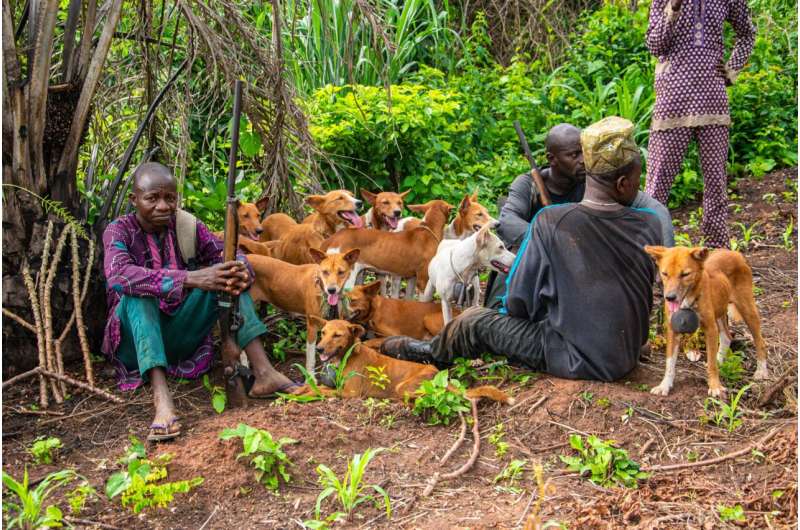
A disease called swine brucellosis is emerging in New South Wales, carried by feral pigs. Endemic to feral pigs in Queensland, and sometimes infecting the dogs used to hunt them, it can be transmitted to humans through blood contact with infected pigs. A number of people have already been infected in NSW.
Recreational pig hunting in rural Australia is a widespread control method for the roughly 24 million feral pigs who call Australia home.
The ethics of this undertaking is open to debate – many authorities consider poisoning more efficient and more ethical than hunting. But regardless of this controversy, the emergence of swine brucellosis illustrates the risk that comes with hunting.
Read more: How dog saliva spreads potentially deadly bacteria to people
How swine brucellosis spreads
Hunting and killing feral pigs to all participants. Adult pigs are large, powerful animals, and their tusks can inflict serious injuries to both human and canine combatants. Despite the leather armour given to pig-hunting dogs, they commonly receive penetrating injuries. These can cause substantial wounds, peritonitis (inflammation of the lining of the abdominal cavity) and even death.
These risks are of course well understood by the people that hunt pigs. But regrettably, many tend to their dogs' injuries without veterinary assistance. Most feral pigs show little outward signs of the disease, so the danger to man and dog can be hidden even to an experienced "pigger".
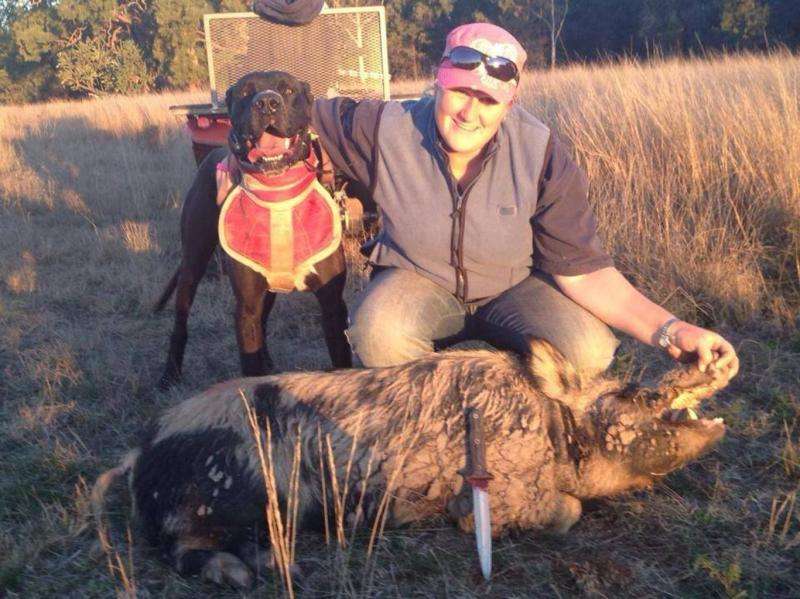
People and dogs can be infected if they have a break in their skin (such as a minor wound or abrasion) that becomes . This can occur during capture, or when the pig carcass is "dressed" in the field. Veterinarians in Australia have also been infected with Brucella suis following surgery on infected dogs.
In people, brucellosis is a systemic disease which can result in undulant fever, lassitude, sore joints and back pain. More serious cases involve . As TIME magazine famously reported in 1943, "the disease rarely kills anybody but it often makes a patient wish he were dead."
Brucellosis (caused by bacterium Brucella suis) can usually be rapidly diagnosed through blood tests and other clinical investigations, as long as the history of pig hunting is disclosed to the medical team. Although there is usually a connection to pig hunting, humans can also be infected by accidental contact with the organism in diagnostic laboratories.
Swine brucellosis is seen only in feral pigs in Australia, and there is currently no risk to humans from pigs kept in . The disease is considered endemic in Queensland, but it appears to be emerging in NSW. We see it more and more commonly in canine patients in the northern parts of the state, as the disease .
This might be a natural process, although some people suspect the deliberate (and illegal) capture and relocation of young feral pigs from Queensland to NSW plays a key role in the spread of infection.
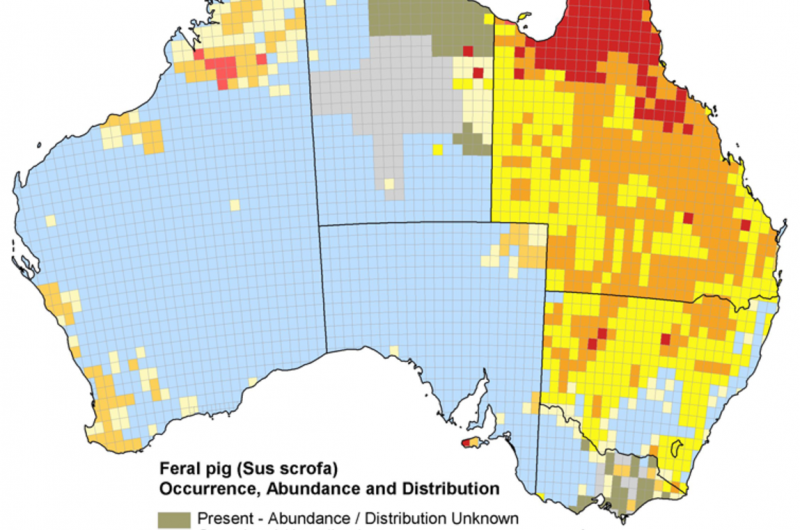
How to protect yourself and your animals
There are some simple recommendations which will reduce the risk of infections in people who hunt pigs, and their families:
- when handling pig carcasses, always cover any skin cuts with waterproof dressings, and if possible, use disposable gloves
- minimise exposure to blood, fluids and organs and always wash hands and arms with soap and water afterwards
- mesh protective gloves should be worn when dressing pigs in the field
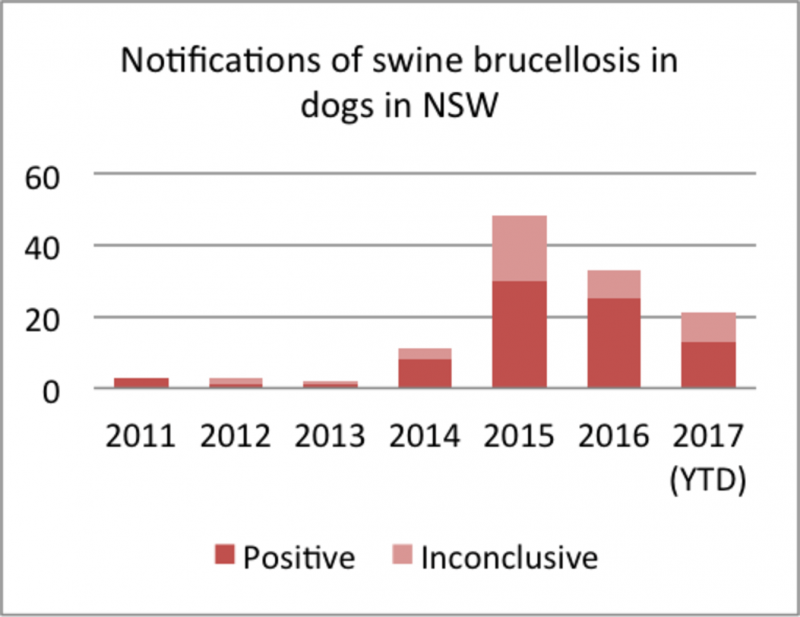
Our focus has been the disease that occurs in "pig dogs", who are at risk of infection from hunting injuries and the practice of feeding raw feral pig meat or offal to dogs after they are dressed in the field. Non-hunting "house dogs" of pig hunters can also be infected if they are fed feral pig flesh.
This can make the diagnosis harder, as the relationship with pig hunting is not apparent. To make matters even more complex the disease can have a long incubation period, so dogs from the country can be infected while young, make their way into pounds and be rescued by people from urban areas where pig hunting is alien, and not often considered by city veterinarians. In one case, a female dog in Sydney had into her lameness and back pain before diagnosis.
Dogs with swine brucellosis can develop various signs including swollen testicles, back pain, joint involvement, abortion as well as the less specific signs of fever and lassitude. The NSW Department of Primary Industries currently provides free testing through the in New South Wales.
It's not all bad news. While euthanasia may be recommended to protect public health, suggests the disease can be treated in dogs using combination therapy with two antibiotics (rifampicin and doxycycline) which are relatively inexpensive. Ideally, this is combined with castration or removal of the ovaries and uterus, to remove any residual infected gonadal tissue. It's too early to tell whether dogs are cured for good but the results are looking promising.
Read more: Protect your puppies: vaccinate them against a new strain of parvo
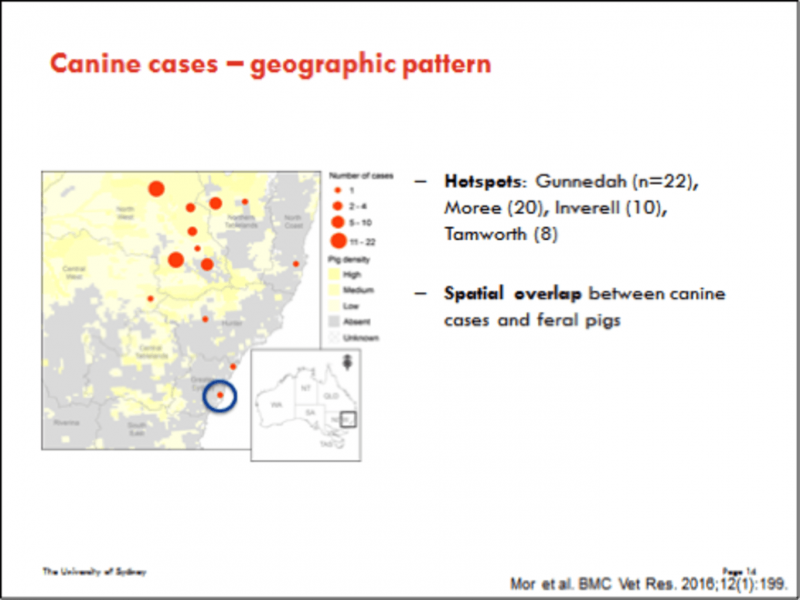
Prevention is always better than cure, so one obvious solution would be to use poisoning of feral pigs as a method of population control rather than hunting. If hunting cannot be prevented, it is strongly recommended that feral pig meat is thoroughly cooked before feeding it to dogs or people – this also kills the parasite that cause and the bacteria which cause . Do not let pig-hunting dogs lick humans, and always wash your hands after contact with feral pigs or dogs.
More information about and can be found on government websites.
Provided by The Conversation
This article was originally published on . Read the .![]()

















